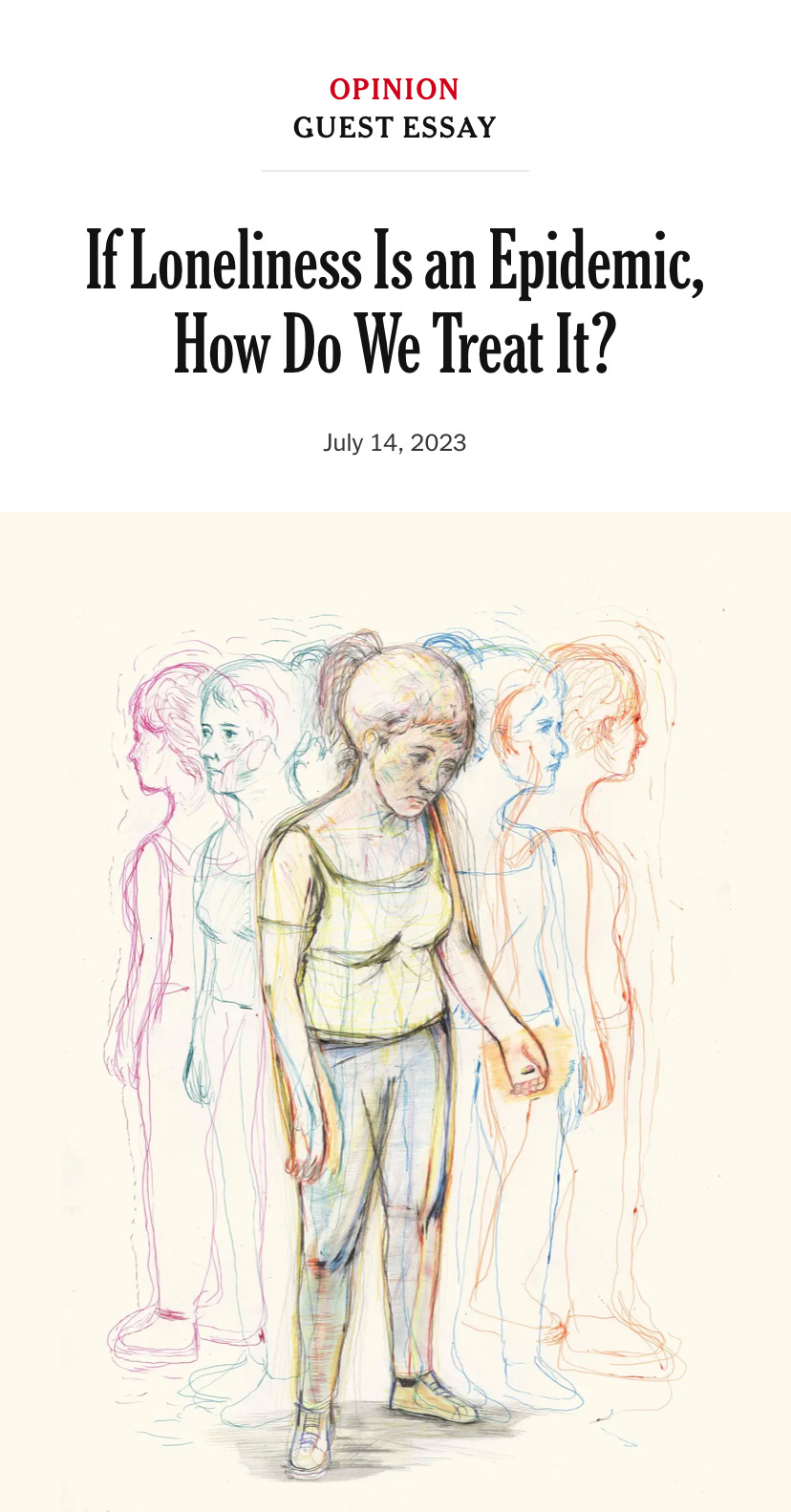Move over Covid. There’s a new epidemic in town.
The U.S. Surgeon General has declared an epidemic of loneliness. The New York Times has run at least seven separate stories on this burgeoning health crisis in the past three months. And the American Medical Association now recommends that physicians screen their patients for loneliness at every visit.
That’s right. The same people who locked you in your home for two years while bombarding you with the message that human interaction would kill you are now very concerned about loneliness. The propagandists who told us to call the cops on our neighbors for having parties and to disinvite unvaccinated friends and family members from our weddings now announce that “loneliness is a biomedical phenomenon with far-reaching consequences.”
According to the latest science, loneliness has nothing to do with the collapse of institutions that once held communities together. Nor is it related to the shift to online work and the ensuing destruction of collegial friendship opportunities. Loneliness, the experts now tell us, stems from disordered brain chemistry. Loneliness is a medical problem.
Industrial medicine and pop culture have already successfully medicalized shyness, sadness, difficulty focusing on boring tasks, and wanting to shop in the wrong aisle of the toy store. So why not loneliness?
Loneliness has gained a position on the ever expanding list of ailments about which you are encouraged to “ask your doctor.” Industrial medicine rarely cures chronic health conditions, but it is really good at assigning chronic illness identities which can then be managed with a lifetime of drug use. And according to the New York Times, scientists are busy at work on a daily drug for loneliness.
Telling your doctor you are lonely could soon land you with a new diagnosis in your permanent health record and a prescription for whatever new patented chemicals are on the horizon for treatment of the condition. Whatever these inevitable loneliness drugs end up being, we know they will not cure your loneliness. The experts themselves tell us so. “Loneliness will never be cured. but it probably can be treated. Medicine will play an important role.”
Given the fact that medical professionals suffer from loneliness at rates far higher than the general population, medical professionals might not be the best people to help you figure out how to be less lonely. That being said, as a medical professional who is not a lonely person, let me give you some (soon to be “anti-science”?) advice.
You are lonely because you lack meaningful connection in your life, not because something is wrong with your brain chemistry. The cure for loneliness lies in finding regular meaningful connection with other living beings. If you are not a people-person, this connection can come in the form of interaction with animals and plants. People-person or not, this connection cannot come solely from screens and the digital world.
Here are some practical suggestions for alleviating loneliness:
If you used to have real life friendships that fell to the wayside without ill-will, reach out to old friends and schedule a walk or coffee or lunch.
Take a real world group class on a topic you find interesting.
Volunteer helping people or creatures less fortunate than yourself. Food banks, elder care centers, animal shelters, etc almost always have opportunities for those who would like to help.
Take a meal to a neighbor or acquaintance who you know is having a hard time.
If you are a religious person, join a church.
If you are struggling with addiction, start going to in-person recovery meetings.
Get off your electronic devices and go outside. Then stay outside for a bit. Smell every flower and rosemary plant you see.
Smile and say hello to people when you are out.
Whatever you do, please don’t start believing that loneliness is a disease for which you need medical treatment. Given the medical system’s track record with sadness and shyness, we know that medicalizing loneliness is unlikely to lead to a less lonely society.





If they can blag you that you need drugs or therapy to fix it, they will label anything as a medical condition.
That’s said it’s not just about money. It also serves to disempower a person by making them question their own strength and what they are able to help themselves.
Another solution: knit with friends!!